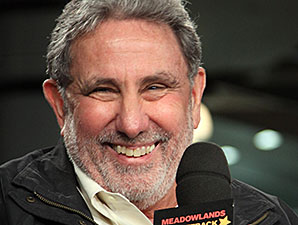Owner Gural Asks Tracks to Lead on Integrity


Standardbred racetrack owner Jeff Gural, one of two featured speakers at the Team Valor International Stan Bergstein Writing Award ceremony Nov. 12 at Fasig-Tipton in Lexington, said track owners should take the lead in improving the integrity of horse racing.
Gural and World Anti-Doping Association senior manager of media relations and communications Ben Nichols were featured speakers at the evening ceremony, at which Chris Wittstruck was honored with this year's writing award for a column on the United States Trotting Association website that called for law enforcement to pursue cheaters in horse racing.
As owner of Meadowlands and two New York Standardbred tracks, Gural banned trainers who have horses who failed drug tests from competing at his tracks, conducted out-of-competition drug tests on horses, cooperated with law enforcement on investigations, and has sent samples to the Hong Kong Jockey Club racing laboratory for testing.
Gural said in examining those samples the Hong Kong lab discovered the use of cobalt, which he said was not on the radar of U.S. regulators and labs until those findings that began in 2013. Gural noted that as property owners, tracks can go further than regulatory officials in enforcing rules and investigating horsemen.
He said when he built the new Meadowlands at a cost of $120 million, he went to the New Jersey State Police to ask them to arrest one trainer, thinking that would act as a strong deterrent against other potential cheaters. At that point the state police informed Gural that as the property owner, he had more latitude in enforcing rules.
"We basically said (to horsemen), 'If you want to race here, you have to sign this stable application that says we have the right to—at any time we want—to go to your barn, go to wherever your horse is, call you up and have you send your veterinarian over because we want to take blood,' " Gural said. "It's called out-of-competition testing. We showed up on Sundays; we showed up when they least expected us to show up."
Gural said current drug-testing programs conducted by state regulators are not effective because horsemen know when the tests will be conducted.
"The reality is we have no drug-testing program," he said. "We have just a sham drug-testing program because the fact is what we basically do is we tell the trainer when exactly when we're going to take the test of the horse, either right before or right after the race. So the trainer knows to within a few minutes exactly when we're taking that blood test, and we tell them what we're testing for. So how are you supposed to catch anybody using illegal medication?"
Gural said out-of-competition testing is needed.
"The reality is no one in their right mind would give an illegal drug to a horse if they know they're going to get caught," he said. "These drugs are administered either at a point in time when they know they won't show up during the hour they know they'll be tested, or they're using drugs they know we're not testing for. I just find that to be a moral disgrace."
Gural said regulators have been too slow to put needed integrity measures in place, and that it's time for tracks to take the lead.
"We've been talking about this for 10 years and we're not closer to a solution now than we were 10 years ago because the industry doesn't appear to have the will to do the right thing—clean this up," Gural said, noting there are some groups trying to change the sport for the better like Water, Hay, and Oats Alliance and efforts to give the United States Anti-Doping agency oversight of drug testing.
Gural said USADA would solve racing's problems, but because of opposition from horsemen and state regulators, he doubted federal legislation aiming to put USADA in power would become reality.
"We have a real dilemma, and in my mind, the only solution is for the track owners to step up to the plate and say, 'Enough is enough.' " Gural said. "We have a moral obligation to these animals, to our customers. We have to be sure that when these horses step on the racetrack they're racing without any illegal medication. It's as simple as that."
Nichols noted that media coverage of drug and medication issues can help the public understand the problem, help point regulators in the right direction, and help make clean sport a reality. He noted that a WADA report on widespread doping by Russian track and field athletes followed up on a report by an investigative journalist.
Nichols said there is unquestionably a huge amount of focus on doping in sport right now and the media can expose problems and educate the public on what groups like WADA are doing to ensure clean sport.
"The media can shine a light on instances of doping, bringing this behavior to the public's attention," Nichols said, noting that such scandals can get the ball rolling on cleaning up a sport. "Perhaps equally important, they can educate the public on not only why doping is wrong in this win-at-all-cost era, but on how the integrity community operates and in what ways it does level the playing field.
"And let me tell you it does take a lot of work: education, investigations, testing, research; these are just a few of the areas in which the community operates."
